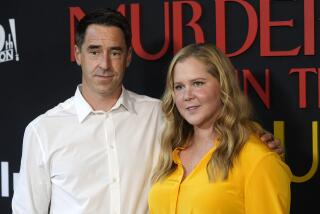TV Picks: ‘Inside Amy Schumer,’ ‘Medora,’ Hannibal Buress, ‘Justified’
“Inside Amy Schumer” (Comedy Central, Tuesdays). This week -- April Fool’s Day, as it happens -- begins a second season for Amy Schumer’s brilliant, biting sketch-cum-stand-up-cum-interview show. Although Schumer, who is 32, has been doing stand-up for about a decade, as with Louis C.K., it took a television show, and the authority of a few passed years, and the time being right, to make her gifts and purposes widely clear.
As before, the subject is largely sex -- the series’ very title is a porn trope -- a subject much, even too much, on the minds of people who make television. But where sex as depicted or exploited on most TV shows tends to feel forced, added on, farcical, juvenile, gratuitous or actually, if non-explicitly, pornographic, “Schumer” takes it as a kind of sociopolitical riddle that lies at the heart of gender roles, power relations, self-esteem and much seemingly unrelated human activity. Like Louis C.K., she’s interested in people and how they are -- the interview segments, on the street, or sitting down with a chosen subject, are funny but also genuinely curious -- and like “Louis,” this is a show that goes intelligently to extremes; it is outrageous, in a mature way. It is true that the younger generations speak of sexual parts and practices with a heedlessness older generations might find alarming, though should not find surprising given that they have grown up on a diet of cable television, hip-hop and Internet pornography: porn, sister, it’s just a click away, click away, click away. But that sort of openness doesn’t make sex any less confusing -- possibly the more so, since there’s so much of it so flagrantly about.
The new season begins with an all-male focus group analyzing the last season, in which every comment goes back to the star’s personal appearance (“She looked better in the stand-up for sure, but then there were just way, way hotter chicks in the skits”) and whether she’d be worth sleeping with. (“If nobody knew” is the consensus; the kicker is that she’s pleased.) Occasionally the points are obvious -- Schumer as a Maria Sharapova type (“I think the most incredible part of Schumeranka’s game is how she manages to be so thin and still have such large breasts”) -- but even the less subtle sketches are well-executed, and more often Schumer and her writers (women and men under head writer Jessi Klein) take the material down side roads, to where the strangest and most surreal ends contain an uncomfortable truth.
BEST TV OF 2013 Lloyd | McNamara
In a variation on a sketch from last season (which is also a kind of version of the pre-Python “Four Yorkshiremen” sketch), a group of women negatively one-up one another: “I was cyber-bullying my niece on Instagram the other day,” says Schumer, “and I literally ate 15 mini-muffins -- I’m so bad,” referring only to the food.
“Yesterday after I knelt on my gerbil to hear what sound it would make, I ate a whole ball of mozzarella like it was a peach,” says another woman. “I’m so bad.”
Schumer: “Two weeks ago when I was having -- well there’s no term for how late term of an abortion this was -- anyhoo, I literally ate an entire bucket of wings and chased it with a 16-ounce lobster. I’m like, why am I still eating for two -- I’m so bad.... Do you think I’m a monster?”
“You’re not bad, you’re stick thin.”
A satire of Aaron Sorkin’s “The Newsroom” set in a fast food restaurant, with Josh Charles (who was on Sorkin’s “Sports Night”) as the manager, catches its stylistic tics -- the walk-and-talk, the overripe dialogue (“You tell corporate I’m not putting apple slices on my menu -- what’s next, no more chicken beaks in the everything?”). But it also goes to the power point: “I worked my way up to being the GM of a Sbarro in Tel Aviv,” says Schumer, as Charles’ assistant, “and then one day I’m stuffing couscous into a calzone and I realized a woman’s life is worth nothing unless she’s making a great man greater.”
“Medora” (PBS, Monday). Filmmakers Davy Rothbart (a “This American Life” contributor, significantly, author, and the editor-publisher of Found, a journal of discarded ephemera) and Andrew Cohn (also connected to Found) spent a year and a half tracking a small town high school basketball team -- declared the worst in Indiana -- and have brought back something quite beautiful and acute. Presented as part of the PBS series “Independent Lens,” it has some of the beats of a sports movie -- the team does improve -- but it’s also a story of young men struggling in a struggling place. (Some are poor, and some are really poor.) The fortunes of the Hornets are made, with little effort necessary, also to stand for the place where they live; both are in danger of disappearing, of being melted, for practical reasons, into some larger administrative body. (There is a prayer at one point, that “in 100 years, the Hornets will be playing ball,” which is a prayer for Medora as well.)
The film is inspirational -- “Believe in one another,” says the coach, “talk to another, communicate” -- without being unrealistic; these characters navigate their future one day at a time. “Hopes and dreams, they can let you down,” says a player cut from the team. One deals with an absent father, another with an alcoholic mother, a third with parents who love but expect little from him. Yet it’s also a story of mentors, and teammates, and adults who parent kids when their own parents aren’t up to it. (The team’s coach and assistant coaches all work full-time elsewhere, as a policeman, a stone cutter and a parson.) “I know that some people say that the Medora basketball team sucks,” says one kid. “I don’t really care. It’s our basketball team. Basketball is really all we have.” A climactic game is tremendously exciting, and like the rest of the film, beautifully photographed, with an eye for humble domestic details, the local landscape, the weather, the air.
PHOTOS: Faces to watch 2014 | TV
“Hannibal Buress: Live from Chicago” (Comedy Central, Saturday). The recurring character Buress plays on “Broad City,” Ilana Glazer’s boyfriend of convenience, a dentist laid back sometimes nearly to invisibility, is not the lively person onstage in this fleet stand-up special, a follow-up to 2012’s “Animal Furnace.” Formerly on staff at “Saturday Night Live” (where he reportedly had only one sketch performed) and “30 Rock,” and currently the sidekick on the Adult Swim’s mock-talk “The Eric André Show,” Buress works fast and occasionally furious here without losing his essential friendliness. Much of the hour is occupied with apparently true stories (partying in New Orleans, meeting Scarlett Johansson, Third World vacations, white people who call him brother, running alongside a cab that refused to pick him up: “I don’t know what I wanted from that -- like he was going to stop the cab and go, ‘Wow, you’re fast -- get in, get in! Damn, you’re so fast I’m not even racist anymore’”), some quick jokes and occasionally pulling back to observe the comedy process. Like any good comic, he finds the world, himself included, astonishing and absurd. Bonus points for use of the word “finagle.”
“Justified” (FX, Tuesdays). The Elmore Leonard-based series this week reaches the penultimate episode of what was recently announced to be its penultimate season. There are absurdities in these Kentucky hills, where law and lawlessness do banter and feint. There are so many changes of allegiance that it’s hard sometimes to keep track of what’s going on, which characters for the moment are making common cause and who’s out to cheat or kill whom, or even the particular thing they’re all chasing after. (Currently, it’s a load of Mexican heroin, though with Nick Searcy’s Chief Deputy Marshal Art Mullen in critical condition, and Joelle Carter’s Ava Crowder trying to survive in prison, the drama is scattered all around. And as usual, family loyalties and fallings-out are at the heart of the action.)
The confusion doesn’t matter much, because Graham Yost, expertly channeling Leonard’s mix of action and comedy, has created a series as tense to watch as it is comfortable to inhabit. Smart casting helps: This season we’ve had Eric Roberts, Alicia Witt, Mary Steenburgen and Shashawnee Hall, among other guests. As Deputy Marshal Raylan Givens, the hero at the center of piece, Timothy Olyphant is ridiculously attractive; as the self-possessed deadliest shot in town, he is nerveless and witty -- it’s as if you took John Wayne’s Ringo Kid, William Powell’s Nick Charles and James Garner’s Jim Rockford and blended them together and poured. Like many great lawmen of fiction, Raylan understands the law on his own, not on received terms; his moral sense is a practical one: not every transgression needs to be marked paid. As much can be said of his criminal mirror image, Walton Goggins’ Boyd Crowder, who manages to be heroic in his own way. (Boyd and Ava are the ones living the series’ great love story at the moment.) Their lives, naturally, are a mess.
Twitter: @LATimesTVLloyd
More to Read
The complete guide to home viewing
Get Screen Gab for everything about the TV shows and streaming movies everyone’s talking about.
You may occasionally receive promotional content from the Los Angeles Times.







